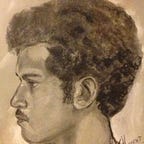The Land.
There was always the land. Or so his pappy told him.
After the slave master’s place and the war.
There was the land.
It was theirs. And always would be.
Worked on it in heat until it froze and then just lived upon it until it could be worked again.
Died on it.
Paid taxes on it.
Breathed it.
There had always been the land.
He could see the white men coming a quarter mile up his own road past the tree that told him and all his kin they were almost home.
A single horse and an old buggy with two white men dressed in hand me down Sunday clothes.
“The land is not yours.”
The old man in overalls who drove the buggy said.
His horse was bought from the Yankees once they left the South.
Yankee war surplus horses were cheap and made the old Redemption men think they had captured one. In reality they had paid two dollars at an auction once the Yankees decided freedom was too costly to stay down South.
As the white man spoke the father stood upright and stopped working.
The whole family stood in disbelief as if a phantasm suddenly appeared to announce the Apocalypse. And the world ending.
The land had been theirs since Freedom came. Longer than the older man had been a full grown man. The house and fields were mixed with blood and fear. Even the foundation still showed the marks of fire from the old night riders.
The night riders could not take it. Nor the carpetbaggers and scalawags. The family worked harder than they did and made the crops grow a hundredfold times the yield from days of the old planters.
And the Yankees had said the land would be theirs forever. They put it on paper. And on trees and at the white man’s courthouse in town.
The promise had been made.
And the promise was as real as the land and water that ran on the ground.
The land was theirs.
They all saw the old general’s paper posted on the wall in the shabby town hall and his father had seen the general himself.
The paper was still there the last time the father paid his taxes. The white man with braces and sleeves rolled up took his money and then briskly pushed a receipt back.
“There,” he said. But always making sure he never touched the Black man’s hands as if even a brief brush of their hands might infect him with the illness of being colored.
They had never left the land. They were there to die and pray and birth and grow and to fight to own it until they the next generation could do the same.
This was all that freedom meant. The rising each day to mix the dirt into their souls.
Now the white man stood in his buggy:
“Y’all got to go.” He spat on the tomato vines.
“This is our land,” the father said “since before ole General Howard died.” The whole family stood like stone figures now. Moments passed.
The white man spat. “We will be back.” And turning his buggy around with the lead horse just barely missing the Black man’s head. “We will be back.”
The family stood watching. The buggy vanished down the muddy road.
And they went back to work. They would not leave. The land was theirs. Old General Howard said so. The post office paper said so. The tax paper said so.
It was theirs as long as they were free. And they were still free.
-Albert Turner Goins
